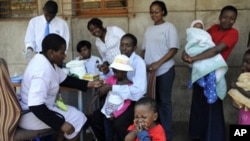The Measles Initiative, a consortium of global healthcare organizations, warns a serious outbreak of measles in Sub-Saharan Africa is threatening all the gains made since 2000 in reducing deaths from this killer disease among children under five.
The United Nations reports nearly 90,000 cases of measles have occurred in sub-Saharan Africa since June 2009, including about 1,400 deaths.
The epidemic is most severe in the southern African countries of Zimbabwe, Zambia, Malawi, Namibia, Lesotho and South Africa.
The Measles Initiative was created in 2001 to tackle the growing problem of the disease in Africa. The group says gaps in the implementation of measles control strategies resulting from a lack of funds has led to the dramatic increase in measles cases.
Andrea Gay is executive director of Children's Health at the UN Foundation, one of the partners of the Measles Initiative. She tells VOA in a phone interview from Washington the enormous progress Africa has made in cutting child deaths from measles is now at risk.
She says a major factor is the dramatic decline in funding. She notes GAVI, the Global Alliance for Vaccines and Immunization, had been donating $150 million to the Measles Initiative, but, this dropped to a little over $20 million in 2008.
"The Measles Initiative was unable to provide the same level of resources to the country," said Gay. "We were asking countries to increase their share and many countries were not able to increase their share to the extent that was necessary to carry out a high quality campaign. One thing that can happen is the campaigns are not as good and then that means there are going to be more pockets of children that are not vaccinated and because measles is infectious, it will find those children and there will be an outbreak."
Measles is easily spread through coughing and sneezing. It can cause severe complications, including pneumonia and diarrhea and lead to death.
While money is a key factor, Gay says measles are easily preventable. To ensure protection, she says at least 90 percent of all children in a country need to be vaccinated through routine immunization.
"We are trying to get countries to improve their routine, their first dose of vaccine to reach more children, but, quite honestly even to do that, usually, it is a question of resources," she said.
However, Gay says money should not be a deterrent. She says it costs less than $1 to vaccinate a child against this killer disease. She says $59 million is needed this year to prevent a resurgence of measles deaths globally.
Measles Outbreak in Africa Threatens Gains




